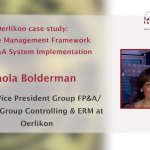What comes to mind when you hear the term FP&A Change Management? Typically, we think of...

We often neglect the human side of Change Management. Fast-paced entrepreneurial environments have swift and constant changes that both leaders and their employees need to adapt to. Hybrid and remote work is placing greater emphasis on the need for increased engagement and communication across teams.
According to the Gartner research, today's work environment requires leaders to be empathetic, authentic, and adaptable.
There is a greater percentage of acceptance of change and staff retention when there is high engagement and a high perception of employee well-being. Research has shown the need for leaders to shift their approach to be more personal and flexible to address the human side of Change Management.
Having recent experience working for a young entrepreneurial company that was acquired by a large corporation, leading with authenticity, adaptability, and empathy has been key for the FP&A team to successfully merge into the greater organisation, integrate into new processes and systems, and manage change. Being a role model who shows resilience, resourcefulness, positivity, and gratitude will help you lead through the human side of Change Management.
Leading with Empathy
Change can impact team members in many ways. They could have uncertainty about their job or their role changing, or they could become change resistant and have decreased buy-in if changes are constantly happening or ideas have been tried before. Leaders should reflect on and recognise these potential impacts on their teams as individuals. Ask questions, check in with your team individually to gauge their feelings about the changes and listen to understand. Be genuine in your concern and understanding of how the change is impacting your team, as it will be able to discern if you are not.
Have conversations with your team where you share how the change is also impacting you. Finding common ground will increase engagement in the change process.
By leaders listening and showing genuine care and concern for employees' well-being as they transit through change, they will, in turn, receive increased buy-in and support from their team.
Leading with Authenticity
By being your authentic self, you will gain the trust of your team as you manage through change. Authentic leaders do not act one way in private and another in public; they are self-aware and genuine. Authenticity means acting with purpose and connecting changes to the overall mission of the organisation. Focus on the long term and spin the change in a positive light. Be a role model showing your team that they can also be authentic and encourage self-expression. Authenticity means being direct in your communications while showing empathy and working toward connecting with your team. Show genuine appreciation and gratitude to your team for the work and effort throughout the change, and recognise that it's not easy.
Leading with Adaptability
We already know that being adaptable is important for Change Management. Showing flexibility for your team is also important.
As you ask questions and lead with empathy, you may find obstacles for your team as they manage work/life balance.
Implementing change can often require long hours, and you may need to allow for flexible schedules or work remotely to accommodate. Being adaptable will create trust. Adaptability also requires resiliency and resourcefulness. Leaders may need to adjust and rebound quickly to unexpected roadblocks or adversity as they manage change, such as team members leaving or projects not going as planned. Remaining calm and not reactionary to roadblocks will cascade to your team's sense of well-being. Provide support that adapts to your team members' individual needs and concerns.
Conclusions
In summary, leading through the human side of Change Management is just as important as managing the steps and processes for the change. Uncertainty and ambiguity can create fear of change for your team. A lack of empathy and failure to listen to these concerns can derail buy-in and successful Change Management. Being your authentic self and having genuine concern and care will create trust with your team. Trust leads to buy-in and is a foundation of successful Change Management. Lastly, be positive, calm, flexible and adaptable.
Change Management does not always go as planned. Leaders will need to pivot quickly for roadblocks and challenges but remain empathetic to impacts on their teams. Following these principles will lead to higher engagement and a higher sense of well-being, ultimately leading to successful Change Management.
Subscribe to
FP&A Trends Digest

We will regularly update you on the latest trends and developments in FP&A. Take the opportunity to have articles written by finance thought leaders delivered directly to your inbox; watch compelling webinars; connect with like-minded professionals; and become a part of our global community.





